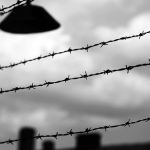In many ways, our time is like all others. Humans are born, live, fall in love, die—the basics. Every person still encounters the challenge of living well, and of facing that daunting task without knowing precisely how to do it. We’re all, as Walker Percy noted, slightly lost in the cosmos. Still, there are moments throughout history in which the task of living well becomes especially difficult—times when the institutions, mores, laws, and social prescriptions are unusually confused or weak, unjust or irrational. Sometimes a collective hysteria or moral revolution uproots the sane and settled ways. And there are occasions when the authorities are supine, abdicating their responsibilities.
Some would consider ours to be such a moment, claiming that we live, in the hyperbolic words of Michel Houellebecq, “in an age . . . miserable and troubled,” in countries “sliding slowly, ineluctably, into the ranks of the less developed countries,” and where people live “lonely, bitter lives.” As Mark Lilla riffs, our polity, having lost its way, all but forces individuals to live “like elementary particles spread out in space, each rotating at its own speed and following its own trajectory.”
I’m hardly alone in noting that young people are particularly affected by the loss of authority and tradition, to various effect: some—the young who make the news—are full of passionate intensity and riotous indignation, but a good many are simply lost, uncertain what to do or how to live. Many lack a sense of moral agency, the urgent responsibility to shape their lives and character. Some of the following is anecdotal, gained from personal interactions with students, but it conveys, I think, a sense of need and longing expressed by the many young people shamefully robbed of their cultural patrimony by their parents, clergy, and teachers.
Four Troubling Signs
Start your day with Public Discourse
Sign up and get our daily essays sent straight to your inbox.First, like many of our current institutions, schools often manifest the thinness of procedural liberalism. In the absence of a substantive vision of the good life, moral categories and language veer to the formal and procedural, thinned out until transparent, unable to bear the weight of actual decision making. In Lost in Transition, a study of emerging adults, Christian Smith and his co-authors note that 34 percent of their interviewees “said that they simply did not know what makes anything morally right or wrong. They had no idea about the basis of morality.” Even more important to note, however, is how many of “these stumped interviewees could not even understand our questions on this point. No matter how many different ways we posed them . . . , our very questions about morality’s sources did not or could not make sense to them. They replied . . . by saying things like ‘I just don’t understand, like what do you mean?’ and ‘I’m not really sure what you’re saying.’” It’s not only that some young adults do not have a coherent account of moral principles; many don’t know what is even meant by moral principles. It’s not part of their mental framework to understand the question, let alone provide answers.
How did that happen? What sort of family and schooling fails to provide young people with the concept of moral foundations?
Second, in terms borrowed from Roger Scruton, our schools are rather good at providing knowledge that (episteme) and knowledge how (techne), but are almost impotent to explain what to do. By this Scruton means something like prudence: knowing what to do with one’s life, and why. As one student complained to me recently, no one in her life—parents, schools, clubs—has given her prescriptions on how to live, no pathways on what a worthwhile life looks like, no tradition of what to do. It’s difficult to conduct reasonable inquiry into moral issues when lacking basic moral categories and a sense of what life is for. Are we surprised when protest, indignation, resentful mobs, and rage replace argument and persuasion?
Third, anecdotally, but I suggest representatively, a student once told me that he attends seminars at the Witherspoon Institute—Public Discourse’s publisher—because it is one of the few places in his life where adults give access to authoritative claims but allow and encourage him to judge and decide for himself. Another student told me that she struggled to understand the questions about life’s purpose I asked because her parents, schools, doctors, and therapists had given her ample means not to wrestle with the existential drama of being a free moral agent. She knew, in a soul-crushing way, that everything depended on her when it came to success, but she felt resigned to a kind of determinism when it came to the point of life, unequipped to deliberate or choose. She not only didn’t know what to do, but she had been trained not to understand the question. Further, I, like many teachers, have had students all but implore me to tell them what to do with respect to dating or marriage or vocation. Lost in the chaos, they look for authority, although disappointed and frightened to learn that the choice must be theirs and cannot be off-loaded to another. Authority offers pathways; it cannot arrogate individual freedom.
Fourth, while there are widely-noted financial influences, the shrinking of students’ vision for life is not unrelated to a truncated education—the excellent sheep phenomenon. In that book, William Deresiewicz warns parents that “the nation’s top colleges are turning our kids into zombies.” He reports that while many of his students were “bright, thoughtful, creative kids . . . most of them seemed content to color within the lines. Very few were passionate about ideas. Very few saw college as part of a larger project of intellectual discovery.” He continues:
Look beneath the façade of seamless well-adjustment, and what you often find are toxic levels of fear, anxiety, and depression, of emptiness and aimlessness and isolation. . . . The prospect of not being successful terrifies them, disorients them. The cost of falling short, even temporarily, becomes not merely practical, but existential.
Or, as Mark Shiffman termed it, contemporary students are “majoring in fear,” racking up credentials and internships and accomplishments but with little sense of what any of it is for.
A Well-Trained Mind, or an Educated Person?
As I see it, the moral thinness of many students is not merely a phenomenon of the post-2008 recession job market or student loans, but symptomatic of a more generalized confusion about moral meaning and inheritance. Many in the West live without a fully developed moral horizon and are confused about themselves. Frankly, I’m sympathetic. I’m not complaining about “kids these days,” since it’s not the kids who are the root of the problem: it is the duty of a coherent society, coherent religion, and coherent family structure to provide a moral horizon. This is the fault of the adults, those who refused the grave obligation to offer tradition to the young. Consequently, as Charles Taylor articulates in Sources of the Self, navigating life in the absence of a moral horizon, when you cannot distinguish up from down, near from far, is to experience vertigo:
To lose this orientation, or not to have found it, is not to know who one is. And this orientation, once attained, defines where you answer from, hence your identity. . . . The portrait of an agent free from all frameworks rather spells for us a person in the grip of an appalling identity crisis. Such a person wouldn’t know where he stood on issues of fundamental importance, would have no orientation in these issues whatever, wouldn’t be able to answer for himself on them . . . would be outside our space of interlocution. . . . We would see this as pathological.
I often use an image loosely borrowed from Walker Percy, which despite its oversimplification is often met with wistful recognition: “My granddad walked down the street and everyone knew who he was, and he knew who he was. My daddy walked down the street and everyone knew who he was, but he didn’t know who he was. I walk down the street and no one knows who I am, and neither do I.” Namely, since our identity requires the mediation of a tradition proposing both answers and questions about what to do, the absence or incoherence of tradition results in confusion about one’s identity and purpose.
Of course, it’s hardly this stark for many, and making this critique does not mean that I pine for some supposed golden age. But the problem is recognized by many young people in their lived experience: a good number feel as though they’ve been cast adrift by the “adults.” In part, this is why some students, few but identifiable, turn to nostalgia projects, feverish activism, or, increasingly, rage. These options provide a form of life with answers about what to do, even when not especially intelligent answers.
Authority should help students recover the moral space, agency, and ability to calmly take a stand, to act, to be responsible in a reasonable way, and to do so in the full range of human and personal acts—not just as producers or credentialed graduates but as persons. The first task of education is cura personalis, the care and formation of the person as an agent capable of living and moving in thick moral space, and skilled in civic friendship that wishes for the other to also freely and responsibly live in the truth without coercion or ideology.
Whenever the university retreats to a thin proceduralism that refrains from this sort of debate, or whenever the university insists on political orthodoxy, it fails in its task of cura personalis. Given the risks entailed in that task, it’s understandable why many would avoid it altogether, retreating into the world of knowing that or knowing how, which is, supposedly, more value-neutral. In doing so, however, the university contributes to the students’ sense of moral vertigo, of not occupying the moral space of a tradition, with an education stifled and truncated. As Michael Oakeshott once wrote:
There are some minds which give us the sense that they have passed through an elaborate education which was designed to initiate them into the traditions and achievements of their civilization: the immediate impression we have of them is an impression of cultivation, of the enjoyment of inheritance. But this is not so with the mind of the Rationalist, which impresses us as, at best, a finely-tempered, neutral instrument, as a well-trained rather than as an educated mind.
While many students and faculty tend in the direction of training, putting their nose to the grindstone and succeeding, others, also suffering from the loss of moral space and the intelligent enjoyment of tradition—that storehouse of answers about what to do—tend to misology, a hatred of reason. That is, while some in the university devote themselves to a kind of techne, others give themselves to an over-heated mood of destruction, critique, unmasking, tearing down. We see that mood in the current riots. If various ages have their flaws, ours is not that of being overly pious to our ancestors and traditions; many have become like the misologues predicted by Plato in the Republic, who learn just enough to destroy—like puppies pulling and chewing—but not enough to discern the good, true, and beautiful in a responsible way.
Our students do not arrive at university simply with gaps in their knowledge needing to be filled; it is not just that they are ignorant of this or that bit of information. Instead, many arrive profoundly malformed by our culture’s catechetical programs, and thus with an incoherent moral horizon, a fractured moral space, living in alienation and fragmentation. Out of compassion, and with all respect for their freedom, universities should help them recover moral space, a sense of horizon, so they can judge and act as free and responsible agents.
That is education worth the tuition.














